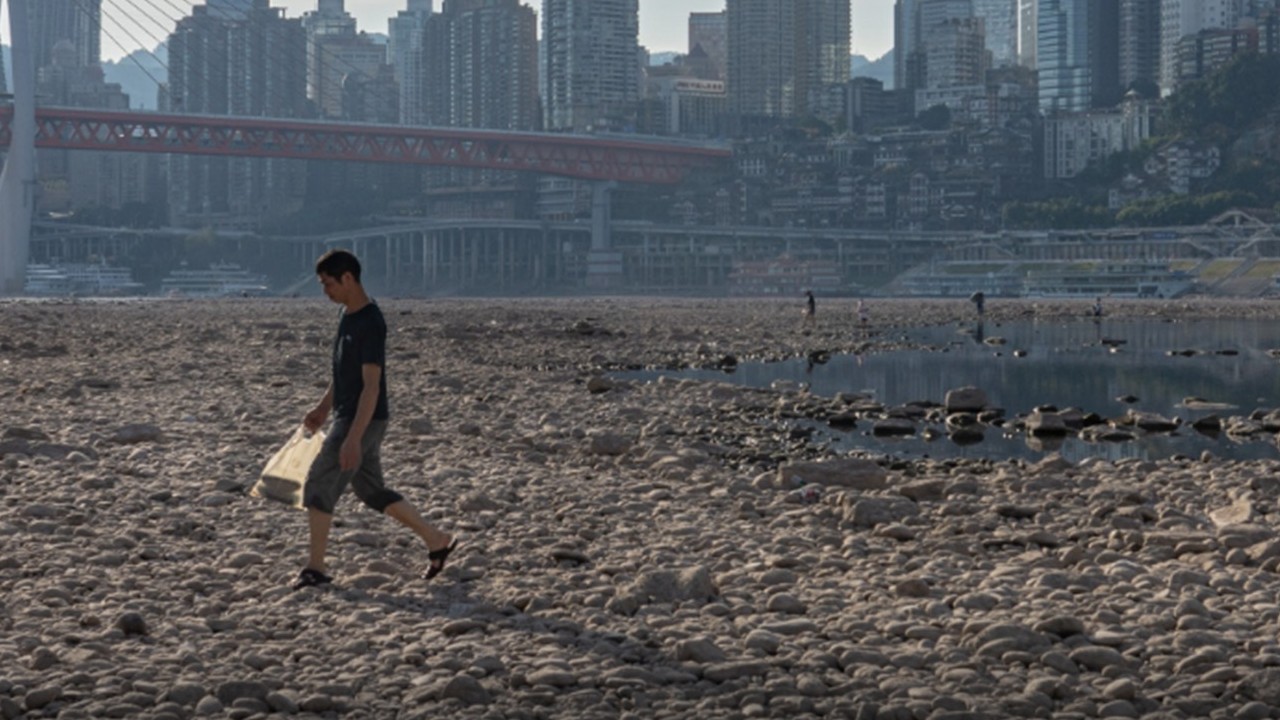
Climate envoy John Kerry told US should be ‘pragmatic and positive’ towards China as he meets Beijing’s top diplomat Wang Yi
- China’s foreign policy chief warns that Washington cannot separate the issue from ‘the overall environment of US-China relations’
- Kerry’s visit comes as both countries, the world’s two largest carbon emitters, are battling extreme heatwaves
Describing the former secretary of state as an “old friend”, Wang called for a “healthy, stable and sustainable” US-China relations.
He delivered the message on the third day of Kerry’s visit, which marked the latest sign of an easing of tensions between Washington and Beijing.
“China is willing to strengthen dialogue and communication with the United States, discuss mutually beneficial cooperation and jointly address climate change,” Wang said, according to a Chinese foreign ministry statement.
“China-US cooperation on climate change has huge potential, and at the same time, it cannot be separated from the understanding and support of the people of the two countries, and cannot be separated from the overall environment of China-US relations.
“[We] hope that the US will pursue a rational, pragmatic, and positive policy toward China, continue to adhere to the one-China principle, properly handle the Taiwan issue, and work with China to practice mutual respect, peaceful coexistence, and win-win cooperation.”
Can climate envoy John Kerry lower the heat in US-China relations?
According to the Chinese statement, Kerry said the US always adhered to the one-China policy and is willing to strengthen cooperation with China based on mutual respect and jointly address global challenges such as climate change.
He stressed that the world expects both Washington and Beijing to cooperate on climate and told Wang that the two nations “cannot let bilateral differences stand in the way of making concrete progress on shared transnational challenges”, according to the US State Department.
“Our hope is that this can be the beginning of a new definition of cooperation and capacity to resolve differences between us,” Kerry said in his opening remarks, according to Agence France-Presse.
He added that President Joe Biden is “very committed” to stabilising US-China relations and hoped to “move forward” and “change the dynamic”.
China stopped cooperating with the US over climate last August in protest at a visit to Taiwan by then House speaker Nancy Pelosi.
Although Biden and Chinese President Xi Jinping agreed to resume climate cooperation when they met last November, the row over an alleged Chinese spy balloon earlier this year delayed the resumption of climate exchanges until April, when Kerry held a call with his Chinese counterpart Xie Zhenhua.
The US statement described Kerry’s meeting with Li as “part of ongoing efforts to maintain open channels of communication across the full range of issues” between the two countries.
Kerry urged Beijing to decarbonise the power sector, cut methane emissions, reduce deforestation and work to “avoid the worst impacts of the climate crisis”.
According to the Chinese statement, Li told Kerry that the two countries should build on the consensus reached between Xi and Biden, “properly manage differences” and try to get relations back on a “healthy and stable” track as soon as possible.
The state news agency Xinhua reported that Li said: “It is hoped that China and the US will continue to uphold the spirit of cooperation, respect each other’s core concerns, seek common ground while reserving differences through full communication and explore more pragmatic institutionalised cooperation.”
He reiterated that developed countries should take the lead in reducing emissions and fulfill their financial commitments as soon as possible while developing countries should “contribute as much as they can”.
US special envoy John Kerry arrives in China for ‘in-depth’ climate talks
The US has long hoped to push China – which has overtaken the US as the world’s largest carbon producer – to cut emissions, especially from coal and methane.
China is still largely reliant on coal for electricity generation. On July 10, China Energy Group, the world’s biggest source of coal-fired electricity, generated a record-high 4.09 billion Kilowatt hours on a single day.
In talks with his Chinese counterpart Xie on Monday, Kerry pressed China to stop building coal power plants and praised the country’s renewable energy development.
Beijing has set an ambitious target of becoming carbon neutral by 2060 and is actively expanding its solar and wind power programmes to meet this goal.
It has also been pushing the US to shoulder more responsibility for climate change and stop undermining its efforts by sanctioning its solar panels.
Li Shuo, a senior global policy adviser on climate at Greenpeace East Asia, said Kerry’s visit was “a hopeful signal” that “the two major emitters are trying to get their climate talks back on track”.
But “substantial differences” remain, he said, adding: “These gaps will only be bridged through persistent efforts from both sides in the run up to COP28 [the next round of international climate talks] to ensure the necessary follow up conversations.”

 - Kawala Xie.jpg?itok=NogZcyZ-&v=1661304068)


